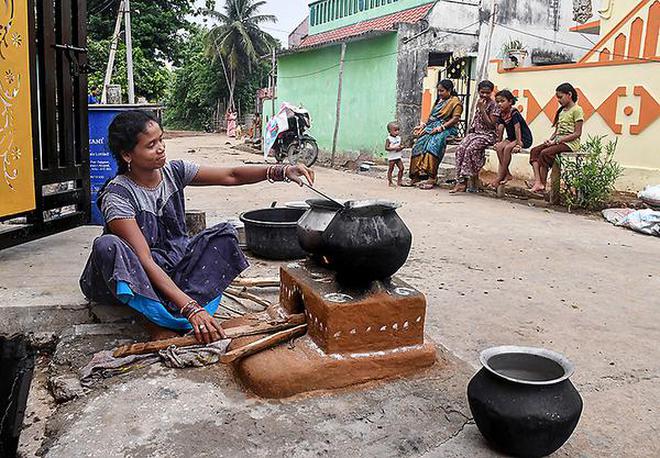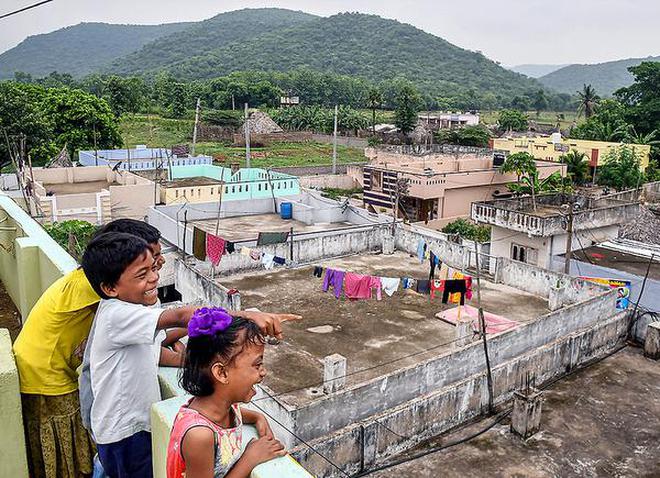For residents of Sambhuvanipalem, June 24 was a day they finally felt connected to the city of Visakhapatnam in Andhra Pradesh, which their village is part of.
Bus no. 25 P/S, decked with marigold, drove down a kuchha road flanked by trees, its driver beaming to the 15-odd people, mostly women and children, who had come dressed in their colourful best, to take a ride. Temperatures had reached 40 degrees Celsius and a heatwave was imminent, but that was not a deterrent to dim the excitement of the arrival of the red-and-white APSRTC vehicle in the Kambalakonda forest reserve, where Sambhuvanipalem lies.
Connecting Sambhuvanipalem, a tribal village in ward number 6 of Greater Visakhapatnam Municipal Corporation (GVMC), the bus will run about 12 km to Maddilapalem. The village in the Bheemunipatnam constituency is about 17 km from the APSRTC complex in Dwaraka Nagar and just 6 km from Dr. YSR ACA VDCA Stadium, which has hosted a number of international cricket matches. Yet, it took 75 years after India’s Independence for public transport to reach an area that is not far from the city centre.
Joy ride
Among the first few who jumped in was K. Anitha, 15, with a heavy school bag weighing down one shoulder. She rushed to a window seat reserved for women, and settled in, wanting to see the forest from a vantage point. Venu, the conductor, waited for a few minutes before blowing his whistle. As the bus started, Anitha looked overjoyed.
“I will not be late for school any more,” she said, explaining how it would take at least an hour and a half to reach Chandramapalem, about 5 km away. “We used to walk in the forest for half an hour and pass a reservoir before reaching the nearest bus stop at P.M. Palem, some 3 km away from our village.” On luckier days they would get an auto-rickshaw from the village or a good Samaritan would offer them a lift to the bus stop.

“Exam days were stressful. We used to be exhausted by the time we reached school because we’d start an hour before,” she says, to ensure they were on time. “Many students from our village have dropped studies due to lack of proper transport facilities. We can focus on our studies now instead of thinking about how to reach school on time,” the student of Chandrampalem Zilla Parishad Government High School says.
Anitha’s close relative, K. Appalaraju, is also in the bus carrying his three-year old son, but in the men’s seat on the right. Mr. Appalaraju had studied in the village primary school. Later, he needed to go to a higher secondary school outside the forest, for which he struggled with transportation. After a year, he gave up studying. Now, he earns his livelihood as a carpenter.
He’s happy, because, “My son Varun Tej will have no public transport issue,” he says, thanking the government for investing in the community.
Three generations of the family of N. Atchiamma have been living in Sambhuvanipalem. “The reasons for not extending public transport facilities to a village located within the city limits all these years are best known to the government. But I once considered stopping the education of my daughter Mohini for lack of a bus service. She passed Class X examinations with good marks recently. Knowing about the recently-launched bus, I admitted her into the Intermediate course,” says Ms. Atchiamma, a mother of three.
Forest as home
Despite being within the limits of Visakhapatnam, many city residents think that there is a habitation beyond Bakkannapalem, considered the last locality in the P.M. Palem area, primarily because this was the last stop. Now, a drive for 10 minutes from Bakkannapalem, and an additional ₹10, take riders into the Kambalakonda reserve forest, named after a local hillock.
A. Appalaraju, District Transport Manager, APSRTC Visakhapatnam, said it was only last year that they found out about the village in the interior and the lack of transportation facilities. “Local MLA M. Srinivasa Rao alerted us about the issue. We started working on it and realised that there were some road issues,” he says, adding that once those were sorted, extending the bus route was not a big deal.

A Forest Department check-post welcomes visitors at the entrance. The 3 km route has views of hills, a reservoir, and the dark green cover of the dry evergreen forest with scrubland and meadows.
Sambhuvanipalem has about 80 families belonging to Manne Dora, a Scheduled Tribe that has lived here ever since they remember. A majority of residents work as farm hands, daily wage labourers and security guards. As many as 15 people have been recruited as security guards in the forest, alerting forest guards to poachers and tracking any unusual animal behaviour.
Apart from the lack of bus service, the village has seen transformation on many fronts, says Isaac, the priest at the local church, who has been living here for more than 40 years. “I remember there were around 20 thatched houses. Many new houses, some of them concrete, have come up over the years, thanks to welfare schemes introduced by successive governments,” he says.
“During my childhood, people used to sell wood procured from this forest in P.M. Palem and Madhurawada. Furniture makers from the city used to purchase wood from our village,” Mr. Isaac remembers. Felling trees from the forest has been prohibited since the area was declared a reserve forest in the year 1970. That’s when residents began to look at farm and other work.
Civic problems
However, many residents complain that development has not been the way it should have been, with several civic issues still troubling them. There’s a lack of drinking water supply facilities, no drainage system or garbage disposal mechanism.
Despite the village being in the GVMC limits, sanitation staff rarely clear the garbage. “There is a vacant place near the village where we burn the waste,” says Ms. Atchiamma. Almost all houses have large drums set up in front, hinting at the lack of continuous water supply to the village. “Water supply is irregular and sometimes insufficient. You cannot rely upon it,” says residents, adding that when they water does come they store it for use.
While most of the cooking still happens on firewood, those who have LPG connections need to cart their cylinders to the agency for a refill; there’s no doorstep delivery here. “We use LPG cylinders very consciously,” says Paramesh, 40.
FAR FROM THE MADDING CROWD
K. Parvathi recalls the many times they have struggled to get medical help in emergencies. “Our village has no primary health centre (PHC). We need to go to the city even to buy medicines,” she says, adding that it’s hard to get an auto-rickshaw to shift a patient to a hospital. This may improve now with the road evened out.
Three young men from the village work as auto-rickshaw drivers, but it’s difficult to reach them over the phone when they’re away in the main city. This is because the mobile phone signal is difficult to catch here, and the tallest building is only three storeys high, so even going to its top does not assure connection.
D. Kishore, a Civic Economics Commerce (CEC) student from Dr. V.S. Krishna College at Maddilapalem, recalls the ordeals they faced because of poor mobile phone connectivity during the COVID lockdown. “During the pandemic, we needed to attend classes online. All the students from our village used to go to a cliff near the reservoir, where our phones showed some bars of signal. The situation has not improved much since. Even now I download my online work when I am in the city,” he says.
A few families in the village have installed FiberNet services and Wi-Fi facilities are being provided by the Andhra Pradesh government. “But you never know when the connection will go,” adds Mr. Kishore. The village has an anganwadi centre and a primary school in which 20 students study. Primary school teacher N. Srikanth comes from Seethammadhara, about 10 km from the village.
“We need to upload pictures after midday meals and other documents online,” he says. He does it when he exits the village or goes to the three-storeyed building. “On lucky days, I upload the pictures and documents using the Wi-Fi facility installed by a resident at his house,” he says.
The school has two classrooms and a toilet for students. It badly needs a boundary wall and a small shed for cooking, says Mr. Srikanth, hoping the government will now pay heed to their problems.
K. Demudu, who is considered the village head, says that despite the lack of amenities, life is peaceful in the village. “Be it a village or a city, problems are everywhere. In case of a problem, all of us sit together and find a solution. The best part of our village is we are close knit and that matters the most,” he says.







